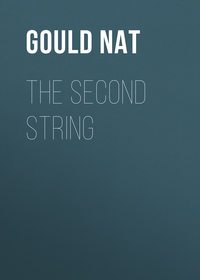 полная версия
полная версияFast as the Wind: A Novel
"You will win the double," she said to Picton. "I am sure of it."
"And I'll try to win a far richer prize before long," he said, looking at her in a way that caused the red blood to mount to her cheeks.
Anstey ran again, but the main opposition was expected to come from Sandy, a Newton Abbot horse. Dick's horse had to give him a stone, which was a tall order, but Brent said he could do it, unless Sandy had improved out of all knowledge.
"I'd take The Rascal to the front this time," said Brent to Picton; "he's in a good temper and when that is the case he likes to make the pace, and he jumps freer."
"If he'll do it, I'll let him," said Picton. "Will he stay there? Remember he's giving lumps of weight away."
"He can do it," was the confident reply.
Six runners went out, a field above the average at Petitor.
Most people thought some of the runners would have been better out of it, they would only be in the way, a danger to the others at the fences; a blunderer is often a veritable death trap.
It astonished Leek, who was on Sandy, to see Picton take The Rascal to the front. He smiled as he thought, "He's making a mistake this time."
Evidently the others thought the same, for they patiently waited for the leader to come back to them.
Arnold Brent smiled.
"I gave him good advice. They're doing exactly what I thought they would, waiting. Let 'em wait."
The distance was two miles and a half. The Rascal held a big lead at the end of a mile and a half. Leek on Sandy thought it was about time he came back to him, but The Rascal showed no sign of this; on the contrary, he gained ground. To go after him was the best thing and Leek tried. Much to his astonishment, he discovered the pace was much faster than he thought; Sandy made very little headway. At first Picton's policy of making the running was considered a mistaken one; this opinion changed as the race progressed; and when they saw Leek hard at work on Sandy in second place and making hardly any headway, The Rascal's numerous backers were jubilant. The cheering commenced, it became deafening as Picton drew near to the winning post. It was an extraordinary race. The Rascal, the top weight, made all the running and won by twenty lengths; more than that, he was not in the least distressed.
Picton was congratulated on all sides. Turning to Dick and Rita he said: "He's one of the best horses I have ever ridden over fences; there's a National in him."
Dick shook his head.
"You're too enthusiastic. Wait until you've cooled down," he said.
"I shall not alter my opinion," said Picton. "Where's Planet?"
"Over there," said Dick, and they walked across.
The next race was the Marychurch Hurdle Plate, and Picton rode Planet. The race needs little description; there were three runners, and Dick's horse won comfortably.
At Torwood that evening there were great rejoicings; but as Picton wished to sleep on the Sea-mew he and Ben were driven to Torquay.
Before he left, Picton said to Rita: "Next time I am here I have a very important question to ask you."
"Have you?" she said. "I wonder what it is."
"Cannot you guess?"
"I'll try," she answered, smiling happily.
"It's too important to put in a hurry," laughed Picton, "and I haven't the courage to do it now."
"Not after four victories," she answered, laughing.
He shook his head, as he got up beside her brother in the trap.
"If you won't sell The Rascal, send him to Haverton," said Picton as they bade Dick good-night.
"All right, I will, and you can do what you like with him," said Dick cheerily.
"Brack's not here; that's strange. We shall have to get some one else," said Ben.
They hired a younger man. He happened to be the boatmen's bookie.
"Where's Brack?" asked Ben.
"He backed the double with me for half a sov.," said the man. "He's about broke me, sir, but I don't begrudge it him; he's a real good sort. I expect he's celebrating it in town."
Brack was not celebrating it; he was biding his time, and opportunity.
CHAPTER VI
IN BRACK'S COTTAGE
BRACK'S was a humble abode not far from the inner harbor. He lived there with his mother. The old woman idolized him; he was a very good son. She attended to their small wants and kept the house scrupulously clean.
"I've brought a mate, mother," said Brack as he entered with his companion.
"He's welcome, my boy." She always called him her boy, and somehow it did not sound strange.
"Come in, don't be afraid," said Brack.
The man stepped into the small room, looking round suspiciously. Why had Brack brought him here, had he any particular reasons for doing so, reasons that would benefit himself?
Brack gathered something of what was passing in his mind and whispered, "You'll be quite safe here, sit down."
They had a fish supper; to the stranger it was the most wonderful meal he had partaken of for some years. He ate greedily, he could not help it, but Brack, watching him, knew he was a well-bred man.
The old lady asked no questions, she never questioned what her son did; she bade them good-night and went to her room. It was then Brack learned something of the man he had brought to his home; and the tale harrowed his feelings, froze the marrow in his bones, horrified him; he shuddered as he imagined what this highly cultured man must have suffered.
They talked until the small hours of the morning, Brack considering what he should do, how to get his companion away from Torquay?
Suddenly he said, "Do yer mind telling me yer name? I'd like to know it in case I hear of yer in the world sometimes. You'll be far away from here, but I'd like to have something to remember yer by and I reckon yer name's the best thing."
The man was startled; again the suspicious look came into his eyes. Would it ever be entirely absent, that haunted gaze; it was pitiable.
"I don't want it if you don't care to give it to me."
"I beg your pardon. You deserve my entire confidence. You are running grave risk for my sake, an unknown man, a stranger, worse – an escaped prisoner from Dartmoor."
"Never mind the risk; we'll not trouble about that," said Brack.
"Do you know what the consequences would be if it were known you had hidden me?"
"I don't know and I don't care," said Brack.
"Think of your mother."
Brack laughed as he said: "She'll glory in what I've done when I tell her; she's Bill out there."
"I forgot; that makes all the difference. And he's innocent."
"Like you."
"How do you know I am innocent?"
"Yer face tells me. I'd trust a man like you anywhere and anyhow."
"If ever I come into my own again, if ever my innocence is proved, I'll see to you and your mother for life, and I'll promise to do all I can for Bill, your brother."
Brack's face glowed.
"Damn me but you're a man!" he said and seized his hand. "I forgot, I'm a fool," he added, as the man winced. The pain from Brack's honest grip was intense.
"I will tell you my name. You may have heard it before – we receive news sometimes – my brother is a famous rider. You are a bit of a sportsman?"
"I am," said Brack. "I've had a tip for the races here, for the double, and I've got ten bob to put on; the gentleman who's goin' to ride gave it me. He says to me as I left the yacht – I'd rowed him out there – he says, 'Here, Brack, there's half a sov. for you. Back The Rascal for the double.' And I mean to."
"The Rascal?"
"That's the name of the horse – funny, isn't it?"
"Who was the gentleman?"
"The owner of the Sea-mew, the yacht lying at anchor in the bay."
"The yacht with such beautiful lines, painted white? I just saw her as I came along by the wall before I met you, my good friend."
"That's her. She's not big but she's a gem. She's been here several times."
"And who is the owner?"
"The same as rides Mr. Langford's horses at the races."
"But you have not told me who he is."
"Ain't I? No more I have! It's Mr. Picton Woodridge."
The man stared at Brack; he seemed on the point of falling off his chair.
"Picton Woodridge," he said in a hoarse voice.
"Yes; have you met him in days gone by?" asked Brack.
"He is my younger brother," said the man. "I am Hector Woodridge."
It was Brack's turn to stare now. This man he had brought to his home Picton Woodridge's brother? Was it possible? This was indeed a strange chance! He peered into his companion's face, trying to trace a resemblance, and found one.
"Yes," he said, "you're like him, or you were once."
Hector Woodridge sighed.
"Once," he said; "it all seems such a long while ago."
"I remember, I recollect now," said Brack. "I wonder it did not strike me afore. Yer a Yorkshire family. I know, at Haverton. I was a boatman at Scarborough when it happened. I always said you were innocent; I call to mind the trial well. Yer Mr. Hector Woodridge, thank God for that; I see a way out of it all. You must bide here and I'll pick the night when I can get you away."
"Get me away!" exclaimed Hector. "How, where shall I go?"
"Leave that to me. There's a man on the watch here. His name's Carl Hackler. He's from Dartmoor, and he's prowling around here on the lookout – has been for a week or more."
"I don't remember his name," said Hector.
"Likely enough not; there's plenty of 'em there as you'd never see, but he's seen you, and he'd recognize you. I've fooled him once and I think he knows it; I'll have a stiff job to do it again; but I will do it, and you'll get clear away."
"What is your plan?"
Brack hesitated; he wondered if Hector Woodridge would care to go on board the Sea-mew, whether he would be afraid to implicate his brother. He decided it would be better for his purpose not to say what his plan was until he had his man safe in his boat on the way to the yacht.
"I'll tell you that when the time's ripe. You'd best turn in and have some sleep; you look as though you could do with it."
"I can. Where shall I go?"
"In there," said Brack, pointing to a small room.
"It is your room."
"Never mind me. Go in and rest."
Hector was dead beat. He opened the door, he was so exhausted he fell fast asleep before he had time to undress.
Brack sat ruminating until an early hour. This discovery that his guest was Hector Woodridge stunned him, he could not comprehend it. He recollected all about the celebrated trial which resulted in Hector Woodridge being condemned to death for the murder of the husband of the woman he had become entangled with. All Yorkshire signed the petition for a reprieve and the sentence was commuted to penal servitude for life. He remembered how the shock killed Admiral Woodridge, Hector's father.
Brack went to the old black horse-hair sofa and lay down. He was soon asleep, dreaming in a few minutes, strange dreams in which convicts, Dartmoor, the Sea-mew, The Rascal, Carl Hackler, and divers and other persons and places were mixed up in the most extraordinary manner.
A knocking at the door roused Brack.
Sitting up, he rubbed his eyes, yawned, struggled to his feet. He had his sailor clothes on.
Another knock.
"Comin'. Don't be in such a hurry. Leave the milk can, yer fool."
Another knock.
"Must be deaf. Drat the lad, what's he wakin' an honest man up at this hour for?"
He went to the door, unlocked it, pulled back the bolt, opened it, and found Carl Hackler standing before him.
As Brack said afterward: "I wish I could 'ave pushed him into the harbor, me a'top of him."
"'Morning, Brack. I want a boat; can you come quick?" said Carl.
Brack's relief was so great that he gave a loud, startling laugh.
"What the deuce is the matter with you? Have you suddenly gone mad?"
"Sane as you are, Mister Hackler," said Brack. "Maybe a bit saner at times."
"I believe you fooled me about that man being rowed out to the tramp. Anyhow the tramp's here, put back for something I suppose, and I'm going to board her before she leaves again, and question the skipper. I particularly want you to row me out because I mean to tell him who gave me the information while you are alongside," said Hackler.
"Now I call that nice of you," said Brack. "Here I gives you the best tip I can and you want to get me into trouble if it's correct. I did my best for yer, Mr. Hackler, on my honor."
"Will you row me out?" said Hackler impatiently.
"What's it worth?"
"Five shillings."
"I'll be with you in a minute," said Brack. "I'll just tell mother."
"Let her know her little boy is going out in good company," said Hackler.
"I'll tell her who I'm goin' with, then she can judge for herself, whether the company's good or bad," replied Brack.
Hackler laughed as he said: "You're a smart chap, Brack."
"Am I? Then perhaps you can find me a job out your way."
"Better where you are," said Hackler, with what sounded very much like a sigh.
Brack went into his mother's room. She was awake.
"What is it, lad?" she asked.
"Hush, mother! I'm goin' out with Hackler in my boat. He's the man from Dartmoor, on the lookout for the escaped prisoner. I'm rowin' him out to the tramp; she's put back again."
She smiled; she knew all about it.
"Tell him not to stir out of that room until I comes home. He'll sleep a good while. He must not come out, not even in here – you understand, mother?"
"Yes, but who is he?"
"He's the man Hackler's after; the man who strangled the bloodhound. He knows our Bill. He's a gentleman; he'll do what he can for him when he's proved his innocence. He is – "
"Come on, Brack; don't be all day," called Hackler.
"I'll see to him, lad, never fear; he's safe with me," said his mother.
"Comin'," said Brack as he went out and joined him.
CHAPTER VII
A CRITICAL MOMENT
BRACK, as I remarked before, you are a smart fellow. Were you putting me off the scent when you said the man I am looking for went off in the tramp?" said Hackler.
"I never said he were the man; I said there were a man went off with the boat's crew to the tramp."
"I gave a description of him."
"It seemed like him to me," said Brack.
They reached the harbor; Brack pulled in his boat; Hackler stepped in and was rowed toward the tramp. The dirty looking steamer was farther out than anticipated, and Brack took his time; his practiced eyes discerned something invisible to Hackler.
"Steam up," said Carl.
"Most likely she'll be going in an hour or two."
"I wonder what she put back for?" said Hackler half to himself.
"Short o' coal," grinned Brack.
"Shut up and don't be a fool," growled Carl.
Brack could see the steamer as he looked sideways over his shoulder. A humorous smile stole over his face.
"She's movin'," he thought.
There was a stir at the stern of the tramp, the screw revolved, she was steaming away, and Carl Hackler was too late. When he recognized this he lost his temper; he had taken his journey for nothing. Catching sight of Brack's face, he fancied he detected laughter there; this did not improve matters.
"Confound you, I believe you knew she was going!" he said angrily.
"Not until the screw turned," said Brack.
Hackler stood up in the boat and waved; some one on the tramp answered the signal but she continued on her way.
"D – n the fellow, why doesn't he stop!" raged Carl.
"Looks suspicious, but he doesn't know who you are. If he did he'd be sure to slow down," said Brack.
Carl turned round quickly; he had an idea he was being chaffed and didn't like it. He stumbled, barked his leg on the seat, fell forward, and sprawled in the bottom of the boat. He did not know a sudden spurt by Brack caused this.
He floundered about, smothered his rage as best he could, then ordered Brack to row him back.
"Hope yer not hurt," said Brack sympathetically.
No answer was vouchsafed to this polite inquiry.
"Looks as though he might be aboard that tramp," said Brack. "They got off pretty sudden; perhaps you were recognized."
"Who'd have recognized me?" asked Carl.
"Him as yer looking for."
Carl laughed.
"Not likely; I don't think he ever saw me."
"But you've seen him?"
"Scores of times."
"You'd know him again?"
"Of course; he's easy to recognize. But they've probably got him by now."
"Poor chap."
"Call him that, do you? You'd not do it if you knew what he was there for."
"Tell me."
"He shot a man whose wife he had been carrying on with. It was a brutal, cold-blooded murder. The husband found them together; they were fairly trapped, so the fellow shot him."
"Funny he should carry a revolver about with him," said Brack.
"It wasn't his revolver, it was the husband's; that's why he was reprieved. It was argued that the weapon was in the room, that on the spur of the moment he picked it up and shot him."
"Oh," said Brack meditatively. "I suppose it never occurred to you, or the larned judge, or the blessed jury, that some one else might have shot him."
Carl laughed.
"Who else could have shot him?"
"It's not for me to say; I'm not clever enough. She might 'a' done it."
"Who?"
"The wife."
"What nonsense! He confessed he did it."
"Eh!" exclaimed Brack.
"I say he confessed he fired the shot."
"And he says he's innocent," said Brack.
Carl stared at him.
"Says he's innocent!" he exclaimed. "How do you know?"
Brack saw his mistake and quickly covered it.
"I lived in Yorkshire at the time. I know all about the trial; I read it."
"Oh," said Carl. "If you read it you know more about it than I do."
"Very likely," said Brack as the boat went alongside the steps.
Carl landed; he gave Brack half a crown.
"Five bob," said Brack.
"But you didn't go to the tramp."
"I couldn't; she was away."
"Then you can't claim the lot," said Carl, who was annoyed at missing the steamer.
"I suppose not exactly," drawled Brack, "but betwixt gents, I should say it holds good."
Despite his annoyance, Carl could not help laughing.
"I suppose you must have it," he said, and handed him another half-crown.
"Goin' home to-day?" asked Brack.
"Home!"
"To Dartmoor."
"That's not my home."
"It's where yer located, at any rate."
"I don't know. There's no trace of the man. It's queer where he's got to; I fancy he's dead – fallen down a mine, or been starved out."
"That's about it," said Brack. "Fancy looking for him round here! Seems a bit soft to me."
"You take a lot of interest in this man," said Carl eying him closely.
"No more than I do in any man who makes a fight for liberty."
"Would you let 'em all loose on Dartmoor?" sneered Carl.
"I'd chance it if there were any innocent men among 'em."
"There are none."
"There's one I know of."
"Who?"
"My brother Bill."
Carl laughed as he said: "Your brother Bill was lucky not to be hanged," and walked away.
Brack scowled after him and muttered: "And you'll be lucky not to be drowned if yer not careful."
When Brack arrived home he told Hector Woodridge what happened.
"By gad, he gave me a shock when he came to the door this morning," said Brack. "You must wait for to-night; I'll come and fetch you if the coast is clear. You'll have to trust me, leave it all to me."
"I will," said Hector. "I can do nothing for myself."
"You can do a lot. If there's danger keep cool and don't betray any alarm – face it out."
"I place myself entirely in your hands," said Hector.
There was no chance that night. Brack stayed about the harbor until ten o'clock. Just as he thought the opportunity favorable Carl Hackler turned up, and Brack made for home, thinking he had not been seen. He was mistaken.
"Something mysterious about the old fellow lately," thought Carl. "He can't know anything; it's absurd, of course; but I'll swear he put me off the scent about that tramp. Confound him, he's a shrewd 'un, he is. It's my belief No. 832 is in Torquay somewhere. There'll be a shindy if he gets away, because he's got a lot of rich relations I believe; somebody's sure to say it's a put up job. There wasn't any put up business about strangling that dog; I can't help admiring the fellow for that. He bore a good name in the prison too."
"No go to-night," said Brack as he came in, "but I've got a bit of news."
"What is it?" asked Hector.
"I've won the first part of my bet with The Rascal."
Hector could not help smiling; it seemed a curious piece of news under the circumstances. He said: "I hope you'll win the double."
"It'll mean a fiver to me," said Brack, "and that's a lot to a poor man."
"You shall have a pocket full of fivers when I prove my innocence," said Hector.
"I'd not take 'em," said Brack. "I'd be satisfied to know I'd done you a good turn, that I would," and he meant it.
Next evening Brack was very well pleased with himself when The Rascal won the double. He proceeded to draw his money and enlighten the youthful bookie on the follies of gambling; he also exhibited some liberality in the matter of drinks to several mates.
He saw nothing of Carl Hackler, although he walked about the streets and loitered near the water.
"I'll try it to-night," he thought. "The races are over and maybe the Sea-mew will sail before morning. There's no telling, and it's the best chance there is; it can't be missed; it's too good, even if we run some risk. If I only knew where that Dartmoor chap was. I'd give half my winnings to know – I'd give the whole blessed lot to get him safe on that yacht."
Brack went home full of his plan, and how best to manage it without exciting suspicion.
It was after ten o'clock when he slipped out of the house. Hector Woodridge followed at some distance, keeping him in sight.
"He's going to the harbor," thought Hector. "What will he do there?"
Brack looked round in every direction as he went down the steps and hauled in his boat. It was no unusual thing for a boat to go out at night to a man-o'-war, or to some craft lying in the bay, but he was not fond of such work and knew if any of his mates saw him it would attract notice. Looking up, he saw Hector leaning over, and beckoned him to come down.
"Once we're out of the inner harbor there'll not be much danger," said Brack. "Chuck that waterproof over yer shoulders; it'll keep yer warm and it looks seaman-like. Now we're ready."
"Hallo, Brack!"
He looked up and saw Carl Hackler on the steps peering at the man in the boat. Brack had wonderful control. It was a matter of more than life or death to Hector Woodridge; if Hackler got him he would be sent back to his living tomb, for such it was to him.
"Oh, it's you!" said Brack with as much contempt as he could master. "And pray what are you doing here? Want another trip in the bay? If you do, jump in and I'll take you. I've got the mate of the London Belle here; he's a bit overseas and I'm taking him out. Ain't that right, Harry?"
"That's the job, Brack, that's it," hiccoughed Hector, who guessed the danger was great.
"I've half a mind to come," said Carl, not quite satisfied, but utterly deceived by Brack's cool manner.
"You'll have ter make up the other half quick," said Brack.
"I'll leave you to it. Mind your mate doesn't fall overboard," said Carl.
"I'll see to that," said Brack.
A hoot came across the bay, a peculiar sound. Brack knew it; it came from the Sea-mew.
He sat down and pulled his best. Would he reach her in time?
Carl Hackler watched the boat until it was out of sight.
The hoot came again.
"What's that steamer sounding?" he asked a sailor close to him.
"The Sea-mew; she'll be leaving to-night, I reckon."
Carl started. Was it possible? No, of course not. What a fool he was; and yet, Brack was rowing as though his life depended on it.
"Better make sure," he muttered, and turning to the boatman said: "Will you row me out to the London Belle?"
"Yes, sir, how much?"
"Half a sovereign," said Carl.
Another hoot came across the bay from the Sea-mew.





